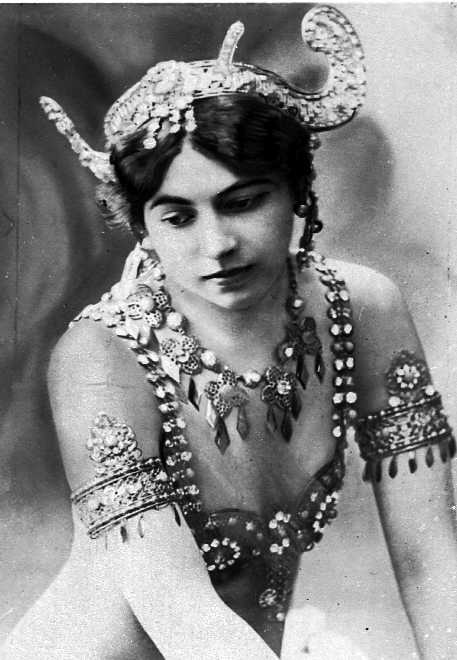
True lies: Caught between the machinations and lies of nations at war, Mata Hari became the perfect scapegoat for the French, who were on the verge of losing the war
Renu Sinha
It is exactly a hundred years since Mata Hari, the Dutch-born exotic dancer, famous courtesan and an alleged spy was executed by the French for being a German spy. But her legend refuses to die down. Her intriguing life has spawned numerous books, films, and musicals.
Her mystique and the many myths surrounding her have gathered a devoted legion of fans, including historians and fiction writers alike, who have steadfastly refused to believe of her being the ‘greatest’ spy that she was made to be.
The latest to join this devout brigade is the best-selling author, Paulo Coelho, who in his latest novel, The Spy, attempts to demystify the myth that was Mata Hari.
The modern-day equivalent of an oracle, Coelho’s musings about the myriad meanings of life have more number of followers on various social networking sites than the armies of many nations put together.
What drew Coelho to her enigma? Was it a rebel soul perhaps finding an echo in another?
Committed to a mental institution thrice by his parents for having dreams of becoming a writer, living the hippie life, doing drugs, jailed and tortured for political activism, Coelho could perhaps empathise and understand what is it to be the wronged one.
Written in the genre of biographical fiction, Coelho uses the first-person narrative to re-imagine Mata Hari’s life through her last letter in prison, written a week before her execution.
‘How is it that a woman who for so many years got everything she wanted can be condemned to death for so little?’ questions Mata Hari. Coelho echoes this on his blog, ‘How was she caught in so many traps, set by both friends and enemies?’Though not an innocent woman, she was innocent of spying. So what was her crime?
‘The crimes I did commit, I escaped, the greatest of which was being an independent woman in a world ruled by men,’ pens the alleged spy in the letter. ‘Mata Hari was one of our first feminists,’ says Coelho, ‘defying male expectations of that time and choosing instead an independent, unconventional life.’
Born Margaretha Zelle in 1876, Mata Hari marries an army officer posted in Indonesia, 20 years her senior, to escape the ‘prejudice and boredom of conservative Holland’ only to fall prey to an alcoholic, abusive husband and the loneliness of an alien land.
Divorced and penniless, she comes to Paris, where she reinvents herself as Mata Hari, ‘a classical dancer to oriental music.’ With her first dance, an artistic, exotic, strip-tease, Paris falls in love with the ‘most feminine of all women with a thousand curves and thousand different rhythms.’ Fame and lovers follow and the belle of Paris soon becomes its most famous seductress.
Mata Hari acquires the reputation of an irresistible temptress whose bevy of pillow partners includes many senior Allied officers and government officials, even the French minister of war and other influential men in many countries. Her frequent travels across international borders to meet them brings her to the notice of both French and German spying agencies.
Declining fame, age and wanting to be with the only man she ever loved, her Russian lover Vadim Maslov, force Mata Hari to accept their proposal. And that's how agent H21 is born.
However, subsequent research and documents, released by the French and British intelligence agencies in recent years, have proven that she had never been the master-spy who traded secrets fatal enough to send thousands of French soldiers to their death.
Caught between the machinations and lies of nations at war, Mata Hari was the perfect scapegoat for the French, who were on the verge of losing the war and needed a distraction. She fitted the bill perfectly because she was a woman ‘without scruples, accustomed to make use of men, she is the type of woman who is born to be a spy’ in the words of prosecutor Pierre Bouchardon.
While Coelho has been able to absolve Mata Hari of the crime she never committed, his barely-skimming-the-surface overtly simple philosophical musings do not do justice to a historically beguiling enigma. His Mata Hari comes across as a rather naive woman and not the bold and unapologetic woman she really was — who refused to be blindfolded and faced her death as she had faced her life — on her own terms, defiantly blowing a kiss to the firing squad.
But for the fans of this oracle of social networking sites who find his pseudo insights profound, a good read.



























